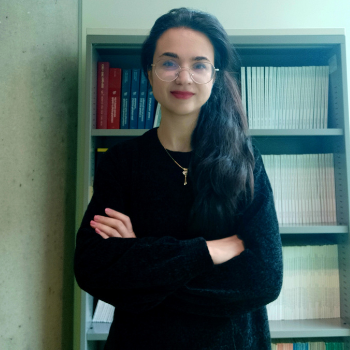We use cookies on this site to enhance your experience.
By selecting “Accept” and continuing to use this website, you consent to the use of cookies.

The International Day of Women and Girls in Science takes place every year on Feb. 11 and is an opportunity to recognize both women and girls in STEM (science, technology, engineering, and mathematics) and celebrate their accomplishments. This international day is celebrated globally in a variety of different ways.
Fahimeh Ziaei, PhD student in Mathematics in the Faculty of Science, has always found pleasure in studying mathematics and doesn’t let the challenges of being in a male-dominated industry get in the way of her dreams.
Ziaei was recently awarded a research grant through the Interdisciplinary Research Institute for Mathematical and Statistical Modelling in Scientific Discovery, Innovation and Sustainability (MS2Discovery) and is optimistic for the future of women in STEM programming.
For me, studying mathematics is a pure pleasure. Mathematics provides fundamental tools and information for other sciences and technologies to understand the world better. It has a powerful logic that gives a feeling of certainty. But there is a secret in solving mathematical problems that makes me enthusiastically enjoy it. The secret is that once you find a solution for a quite challenging problem, you will say: “Aha, I see.” I am deeply in love with that moment, and I love to hear it from the students I am teaching, which is the most rewarding part of mathematics for me. This moment only shows its beauty to the patient and curious people who reach the end of the solution.
My role model was Professor Maryam Mirzakhani, the first female Fields Medal winner. The Fields Medal is the mathematical equivalent of the Nobel Prize. Since she was an Iranian mathematician, she was a great source of inspiration for me.
Here at Wilfrid Laurier University, I won the Interdisciplinary Research Institute for Mathematical and Statistical Modelling in Scientific Discovery, Innovation and Sustainability (MS2Discovery) research grant and award recently.
Obviously, the number of women is far less than men in the field of mathematics in general. Mathematics is a male-dominated field. It can be seen from several points of view, but I believe stereotypes and cultures primarily affect it.
The fact that it took until 2014 for a woman to win the Fields Medal shows how difficult this path
is for women to reach the as high as they can get in the field of math. But if we go back, a few decades ago, we will see the number and proportion of women — not only earning top academic degrees, but in bachelor’s degrees — are very low in science, and I believe the increasing number of women in science in recent years tells its own story about positive changes.
But the growing number of women reaching a higher degree of science does not mean the roadblocks that steer women away from reaching high levels of academic career and leadership positions have been removed. This positive change is not something that happens in two, three or five years. It takes a long time. Even it can take decades, but eventually there will be a balance for gender equality. I am pretty optimistic about the changes.
The first and foremost is that in many cases maintaining an academic career in science means dedicating long hours of hard work and research, so finding a balance between family responsibilities and academic expectations is not always easy.
Another challenge is that, based on what I have mentioned before, some areas, such as mathematics, are considered male-dominated. Women need a lot of self-confidence in order to participate in research, get leadership positions in academia and pave the way for other women to succeed in their career paths.
I would love to see the celebration and the achievements of women in science showcased even more. There could be more scholarships and funding opportunities at universities awarded just for women. It is our responsibility to encourage the young girls around us to chase their dreams and not be afraid of losing or failing. We need to do our part not just to make our own life better, but to make life better for all women. In this way, we would make life better for all people.